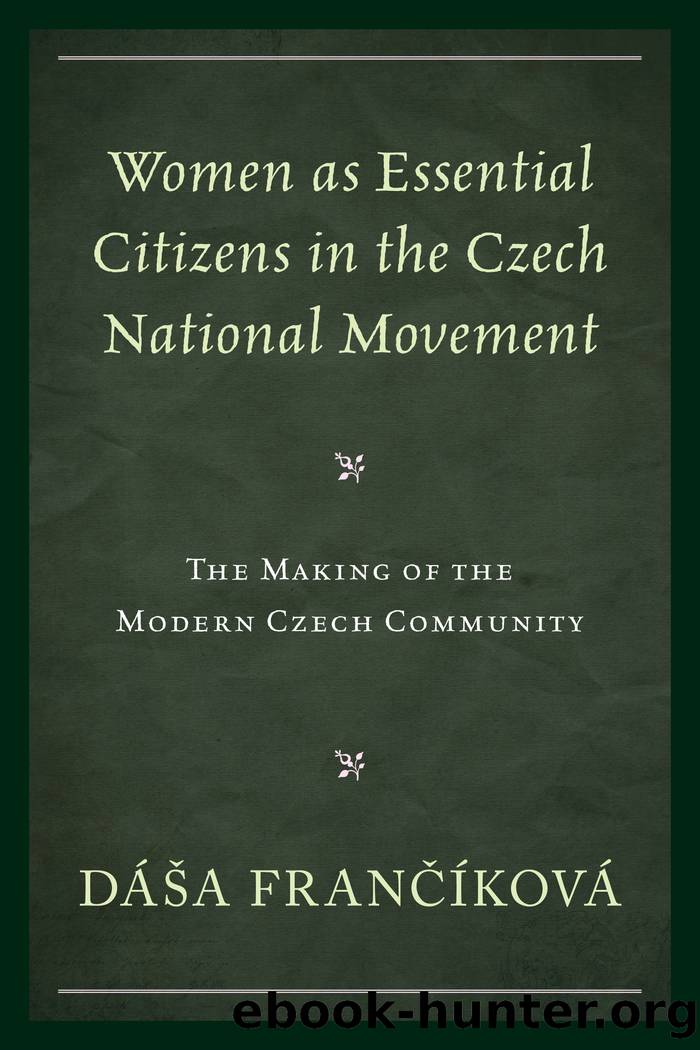Women As Essential Citizens in the Czech National Movement by Frančíková Dása;

Author:Frančíková, Dása;
Language: eng
Format: epub
Tags: undefined
Publisher: Lexington Books/Fortress Academic
Published: 2012-08-15T00:00:00+00:00
Chapter 3
The Queer Story of
KateÅina MarÅ¡alová
The Female Soldier, Ideal Woman,
and Masculine Femininity
In 1845,[1] the popular journal KvÄty featured an article entitled âKateÅina MarÅ¡alová, amazonka Äeská.â[2] The curious piece told the tale of KateÅina MarÅ¡alová, an ordinary woman who, around the mid-eighteenth century, supposedly enlisted in the Austrian army and joined a regiment of dragoons dressed as a man. She enjoyed a successful career in the military, and after it was accidentally discovered that she was a woman, MarÅ¡alová was summoned before the Austrian empress Maria Theresa, who publicly praised her and rewarded her bravery.
This is hardly the typical story in which the female soldierâa woman who cross-dressed to enlist in the armyâis either an aristocratic woman who fights out of patriotism, or a lower-class woman whose gender transgression raises the possibility of same sex desire and sexual behavior.[3] The article presented MarÅ¡alováâs tale in contradictory waysâas a nationalist exemplar, a cautionary tale, and a story of gender transgressionâthat would both support and undermine notions of the ideal woman. This chapter unpacks the layers of the story in these paradoxical ways in order to reconsider what the phenomenon of a female soldier can contribute to our understanding of issues including gender transgression and the requirements for the ideal woman.
Indeed, the exceptional reception by the empress is not the only aspect that makes this story so intriguing. The crucial point of the story is that the anonymous author presented MarÅ¡alová as a role model for Czech women, while maintaining that MarÅ¡alová joined the army because she was âadventurous, bored with her duties as a nanny, and disliked caring for children.â[4] After she left the army, MarÅ¡alová married another soldier and had three children. Even with the heterosexual sop that followed her discharge from the military, MarÅ¡alová does not quite seem to fit the exemplary ideal national woman who would guarantee that the Czech nation would be prosperous, advanced, and generally on a par with other well established modern nations. Czech nationalistsâlike activists in other similar national strugglesâurged women to take an active part in their nationâs construction. In no way, however, were women allowed to forget their duties as housekeepers, mothers, and child educators. The early deaths of MarÅ¡alováâs children and husband, as well as the poverty from which she suffered toward the end of her life, seem to punish her breach of womanly duties that led her to join the military. But in spite of this (or perhaps because of this, if we read the story as a tragic romantic tale), the author never condemned MarÅ¡alová. Surprisingly, the story glorified her and proclaimed her to be a âCzech [woman] who showed exemplary fervor, unselfish love, and determination [and could] carry out great efforts [on behalf of the Czech nation].â[5]
My goal here is not to investigate whether MarÅ¡alová was an actual person and female soldier, or whether the author told an accurate story. Even though there are elements that make the story unlikely, it does not matter whether it was a description of a real female soldierâs life.
Download
This site does not store any files on its server. We only index and link to content provided by other sites. Please contact the content providers to delete copyright contents if any and email us, we'll remove relevant links or contents immediately.
The Vikings: Conquering England, France, and Ireland by Wernick Robert(79222)
Ali Pasha, Lion of Ioannina by Eugenia Russell & Eugenia Russell(39939)
The Vikings: Discoverers of a New World by Wernick Robert(36830)
The Conquerors (The Winning of America Series Book 3) by Eckert Allan W(36715)
Cecilia; Or, Memoirs of an Heiress — Volume 1 by Fanny Burney(32092)
Cecilia; Or, Memoirs of an Heiress — Volume 3 by Fanny Burney(31481)
Cecilia; Or, Memoirs of an Heiress — Volume 2 by Fanny Burney(31435)
Empire of the Sikhs by Patwant Singh(22779)
Hans Sturm: A Soldier's Odyssey on the Eastern Front by Gordon Williamson(18341)
The Secret History by Donna Tartt(18267)
Cat's cradle by Kurt Vonnegut(14804)
Sapiens: A Brief History of Humankind by Yuval Noah Harari(14006)
Pimp by Iceberg Slim(13828)
Talking to Strangers by Malcolm Gladwell(12916)
Norse Mythology by Gaiman Neil(12879)
Leonardo da Vinci by Walter Isaacson(12833)
Underground: A Human History of the Worlds Beneath Our Feet by Will Hunt(11857)
4 3 2 1: A Novel by Paul Auster(11842)
The Radium Girls by Kate Moore(11651)
